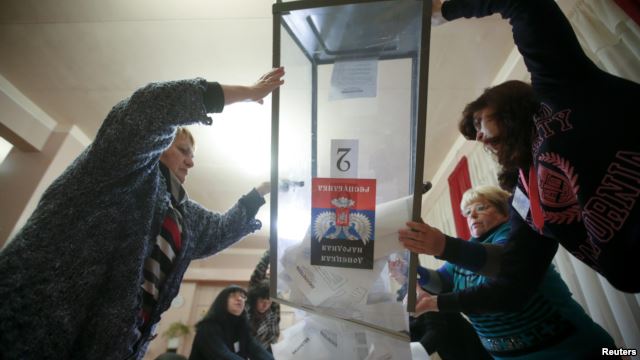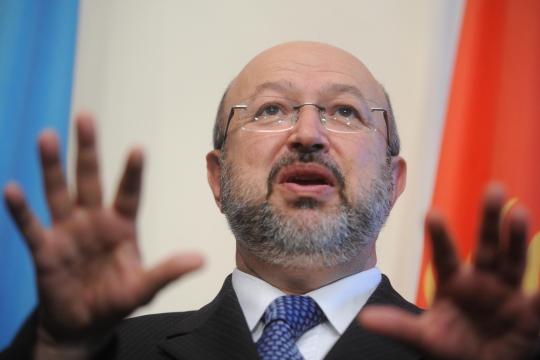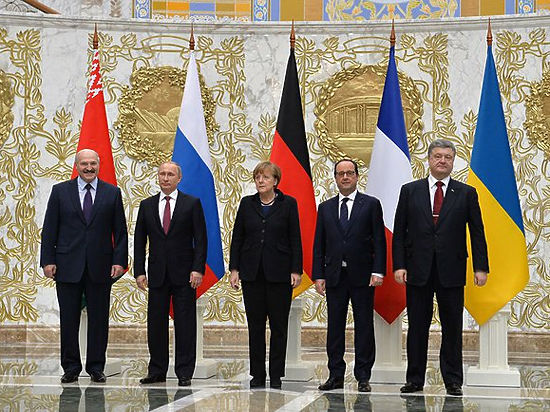The pseudo-elections in some districts of Donetsk and Luhansk oblasts put the peace process in jeopardy, and Ukraine will react to this challenge adequately, stated President Petro Poroshenko this Sunday. He emphasized that the so-called ‘elections’ in the occupied districts of Donetsk and Luhansk oblasts have nothing to do with the expression of people’s will and directly violate the ‘Minsk accords.’
“The farce under first of tanks and rifles that the two terrorist organizations set up in part of Donbas is a horrible event which has nothing to do with real expression of will,” the press service of the President cites his words.
According to Poroshenko, the Minsk protocol prescribes holding early local elections based exclusively on Ukrainian law in individual districts of Donbas. Therefore a clear violation of the international agreements poses a threat to the peace process. Ukraine will react to this challenge adequately, Petro Poroshenko assured.
“New territories should have elected leaders”
Meanwhile Moscow is ready to acknowledge the ‘elections’ in the ‘LNR’ and ‘DNR.’ This was particularly emphasized by the Minister for Foreign Affairs of Russia Sergey Lavrov. He assured that the voting in the ‘people’s republics’ was allegedly not against the Minsk accords.
The head of the Russian President’s Administration Sergey Ivanov also supported these elections, claiming that “new territories should have elected leaders.” And in general, that after the voting is held, the situation in Ukraine may return “back to normal.”
“Everything follows the ‘Transnistria scenario’ absolutely”
As journalist and blogger from Donetsk Denys Kazansky noted to Radio Liberty, the future of the regions of Donetsk and Luhansk oblasts which were occupied by separatists depends entirely on the Kremlin, and not on Alexandr Zakharchenko who allegedly achieved convincing victory at the ‘DNR’ elections. As the current situation in Donbas benefits Putin. He needs instability in Ukraine, a wound that does not heal. In order to prevent Ukraine from joining the NATO and the EU. The master of the Kremlin needs Transnistria 2.0 and these pseudo-elections serve to fixate it.
“I think that everything follows the ‘Transnistria scenario’ absolutely. The local frozen conflict led to everyone getting used to Transnistria’s existence. However the market there is very small, only about half a million citizens and a very tiny bit of land. Donetsk and Luhansk, which have a border with Russia and a population which is bigger than that of any of the Baltic republics, is a better thought-out project than Transnistria. So certain funds can already be milked from Donbas. I mean exporting coal, metal and utilizing the factories that were left there. I think that in principle he is able to control this territory, adjacent to Russia, for a quite a long time to come,” noted Denys Kazansky.
Russian politics expert Stanislav Belkovsky expresses a similar opinion. To his mind, Vladimir Putin has been playing white in this several-month-long conflict with Ukraine in particular and the West in general. And it seems to the Russian President that he achieved de facto independence for the ‘DNR’ and ‘LNR.’ These so-called republics will be a constant source of situational instability in Ukraine, should the Kyiv government (whatever it may be) ignore the Kremlin’s demands.
“The territories themselves don’t interest Vladimir Putin that much. What is important to him is not Donbas, for which he does not want to bear economic responsibility, but he constant opportunity to destabilize the situation in Ukraine. Therefore, the option of Transnistria. And from Putin’s perspective, he is winning, as he was able to impose his agenda on Ukraine,” Stanislav Belkovsky thinks.
“The new Ukrainian project and the system of global security have won”
However, another Russian political expert Andrey Okara thinks that it is too early to celebrate Putin’s victory in regard to the ‘DNR’ and ‘LNR.’ If in Donbas, and first and foremost in the main cities of the region, Donetsk and Luhansk, they had only held elections to the Verkhovna Rada, the eighth Ukrainian Parliament would have had quite a powerful pro-Russian lobby. Second, by openly neglecting the ‘Minsk Accords,’ Moscow showed once more that the West can only converse with it using the language of sanctions.
“It can be said that Putin overplayed situationally and tactically, however, Ukraine won strategically. The new Ukrainian project and system of global security have won,” concludes Andriy Okara.
Meanwhile US Secretary of State John Kerry emphasized in an interview to Bloomberg that Russia’s statements about supporting the separatist ‘elections’ on November 2 are out of line according to the Minsk agreements approved in September. At the same time, John Kerry noted that the sanctions imposed by the West “have a deep influence on the Russian budget and economy,” and Russia is going through “serious problems.” “President Putin really should decide whether he wants to respect the sovereign rights of the people of Ukraine and work with us in a constructive manner.”








